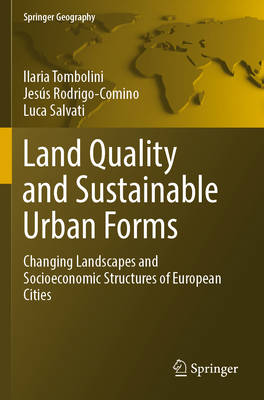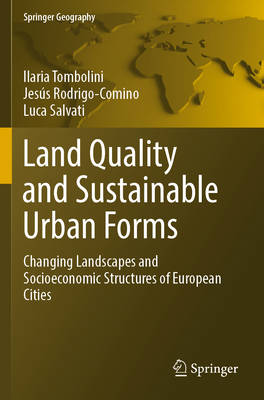
- Afhalen na 1 uur in een winkel met voorraad
- Gratis thuislevering in België vanaf € 30
- Ruim aanbod met 7 miljoen producten
- Afhalen na 1 uur in een winkel met voorraad
- Gratis thuislevering in België vanaf € 30
- Ruim aanbod met 7 miljoen producten
Zoeken
Land Quality and Sustainable Urban Forms
Changing Landscapes and Socioeconomic Structures of European Cities
Ilaria Tombolini, Jesús Rodrigo-Comino, Luca Salvati
€ 183,45
+ 366 punten
Uitvoering
Omschrijving
In the panorama of studies related to the ability of lands to support both natural processes and agricultural production activities, this research introduces a still unexplored or under-studied theme which is that of the relationship between urban sprawl in its various forms and land quality.
The first part of the book is dedicated to the motivations and the theoretical premises from which the research originates, connected to the concept of land and those of sustainable urban form. The second part concerns the complex path towards a sustainable use of land, both in terms of institutional and regulatory measures, and in terms of knowledge and understanding of soil degradation processes. This research focuses on the Mediterranean area which is discussed in more detail in the third part. In this part of Europe we try to establish relationships between settlement dynamics and land quality: here fragile ecosystems are diffused both from a biological point of view. physical as well as socio-economic, here we find landscapes that are particularly sensitive to land degradation processes (subject to land degradation, considered the antipodes of land quality) and which in recent decades have been particularly affected by anthropic pressure.
In the fourth part, an analysis is presented concerning 76 metropolitan areas representative of southern Europe. The methodology used in this analysis is based on the relationship that exists between soil sealing (or soil waterproofing) and land degradation (or land degradation) aimed at an interpretation, at the metropolitan scale, of how in southern Europe the pattern of Urbanization (compact, dispersive, intermediate) affects the land's ability to support both natural processes and agricultural production activities in a diversified way. In particular, the data on land quality and data on land use were considered together in order to analyze the processes of urban growth and the occupation of productive land for a very large area that includes Greece, France, Italy, Spain, Portugal and some parts of the Adriatic coast.
There is still a long way to go, in terms of sharing, integration and definition of strategies aimed at achieving certain targets. A necessary and innovative look towards land quality could help to consider the protection of the soil as a whole, even at the planning level.
The first part of the book is dedicated to the motivations and the theoretical premises from which the research originates, connected to the concept of land and those of sustainable urban form. The second part concerns the complex path towards a sustainable use of land, both in terms of institutional and regulatory measures, and in terms of knowledge and understanding of soil degradation processes. This research focuses on the Mediterranean area which is discussed in more detail in the third part. In this part of Europe we try to establish relationships between settlement dynamics and land quality: here fragile ecosystems are diffused both from a biological point of view. physical as well as socio-economic, here we find landscapes that are particularly sensitive to land degradation processes (subject to land degradation, considered the antipodes of land quality) and which in recent decades have been particularly affected by anthropic pressure.
In the fourth part, an analysis is presented concerning 76 metropolitan areas representative of southern Europe. The methodology used in this analysis is based on the relationship that exists between soil sealing (or soil waterproofing) and land degradation (or land degradation) aimed at an interpretation, at the metropolitan scale, of how in southern Europe the pattern of Urbanization (compact, dispersive, intermediate) affects the land's ability to support both natural processes and agricultural production activities in a diversified way. In particular, the data on land quality and data on land use were considered together in order to analyze the processes of urban growth and the occupation of productive land for a very large area that includes Greece, France, Italy, Spain, Portugal and some parts of the Adriatic coast.
There is still a long way to go, in terms of sharing, integration and definition of strategies aimed at achieving certain targets. A necessary and innovative look towards land quality could help to consider the protection of the soil as a whole, even at the planning level.
Specificaties
Betrokkenen
- Auteur(s):
- Uitgeverij:
Inhoud
- Aantal bladzijden:
- 169
- Taal:
- Engels
- Reeks:
Eigenschappen
- Productcode (EAN):
- 9783030947347
- Verschijningsdatum:
- 30/03/2023
- Uitvoering:
- Paperback
- Formaat:
- Trade paperback (VS)
- Afmetingen:
- 156 mm x 234 mm
- Gewicht:
- 258 g

Alleen bij Standaard Boekhandel
+ 366 punten op je klantenkaart van Standaard Boekhandel
Beoordelingen
We publiceren alleen reviews die voldoen aan de voorwaarden voor reviews. Bekijk onze voorwaarden voor reviews.







